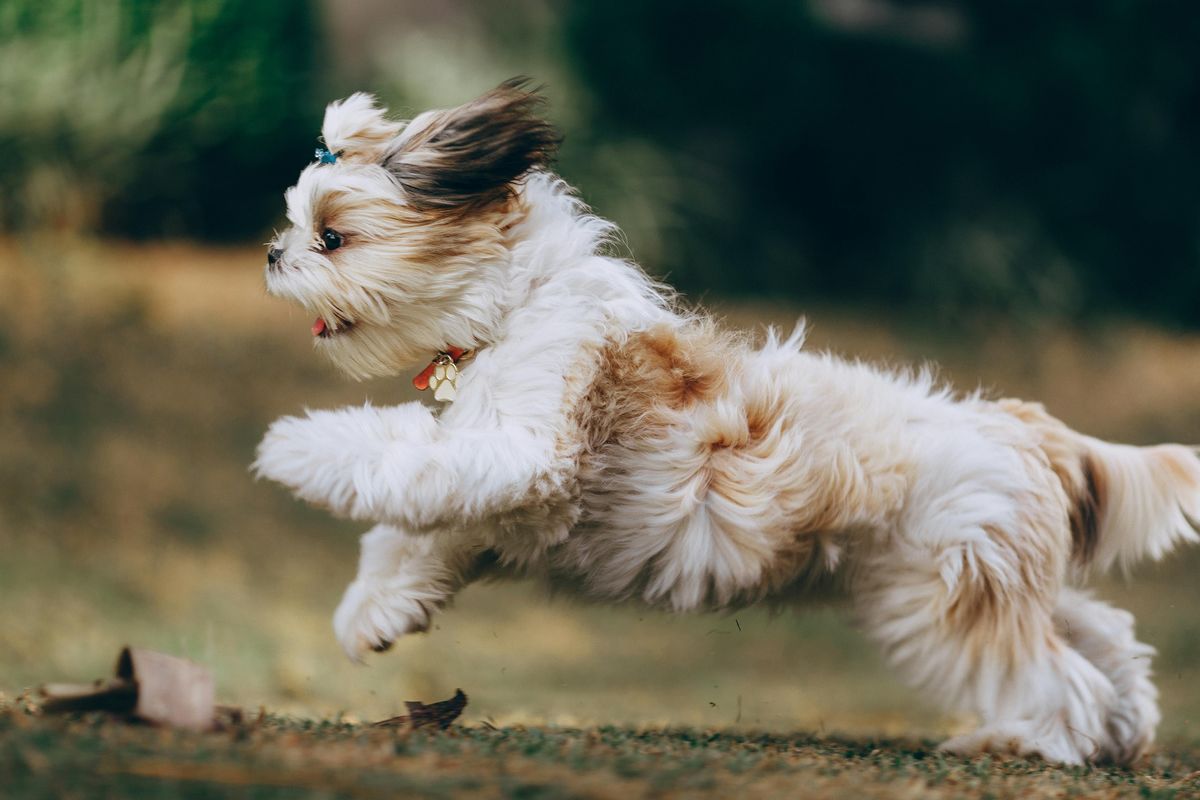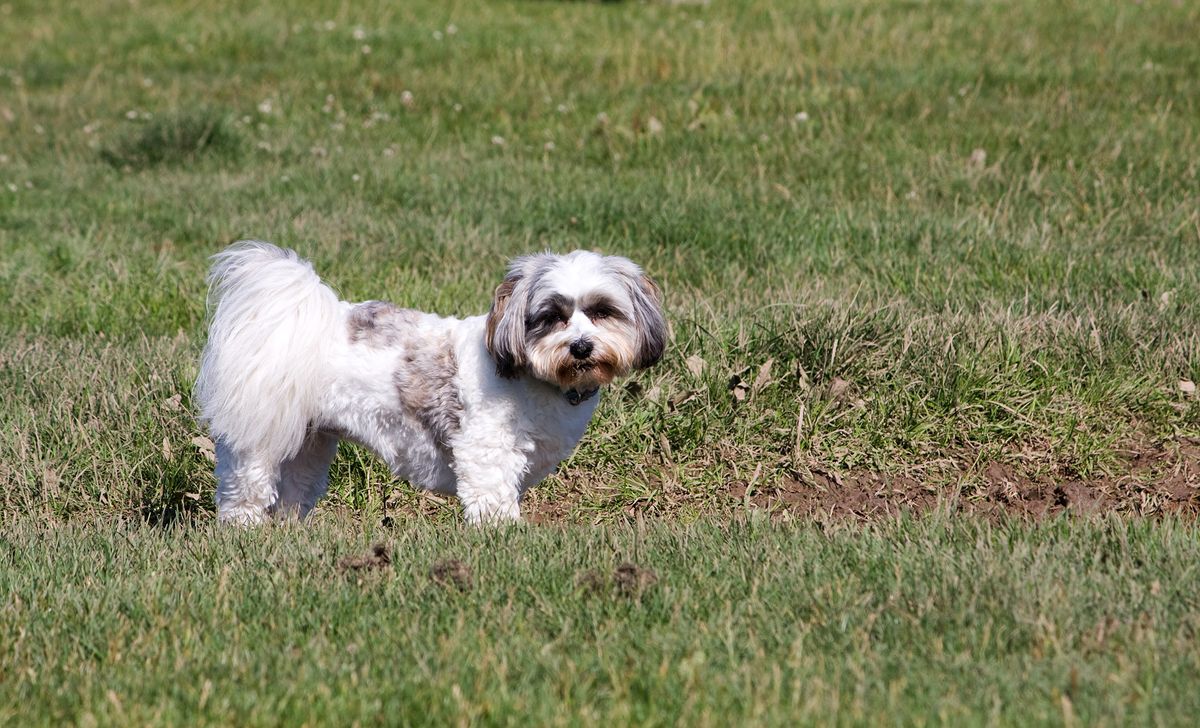The Shih Tzu, often referred to as the ‘little lion’, is a breed that captivates with its affectionate nature and adorable appearance. Despite its small stature, this toy breed is known for its strength, loyalty, and playful demeanor, making it a favorite among dog lovers. In this comprehensive guide, we delve into the essential aspects of Shih Tzu care, including health, lifespan, and canine intelligence. We aim to provide valuable insights for current or prospective Shih Tzu owners to ensure these charming dogs lead happy, healthy, and fulfilling lives.
Key Takeaways
- Shih Tzus are companion dogs with a happy, lively temperament, suitable for various living situations, including apartments.
- Proper care and awareness of hereditary conditions are crucial for maximizing a Shih Tzu’s lifespan, which can reach up to 20 years.
- Shih Tzus require mental stimulation and moderate exercise to maintain their well-being, despite their adaptability to apartment living.
- Training a Shih Tzu demands patience and consistency, as they are intelligent but may be stubborn; healthy treats can aid in training.
- Regular grooming is essential for Shih Tzus due to their long, luxurious coats, and establishing a routine can help manage common grooming issues.
Breed Characteristics and Temperament

Defining the Shih Tzu’s Personality
The Shih Tzu, often referred to as a "little lion," is a breed that embodies the essence of a companion dog. Their personality is characterized by a joyful and playful disposition, making them a delightful addition to many households. Despite their small stature, they are known for being outgoing and affectionate, often displaying a friendly and trusting attitude towards everyone they meet.
Shih Tzus are not just about their charming looks; they possess a unique blend of character traits that set them apart. They are typically happy and lively, with a low tendency to wander, preferring the comfort of their home environment. This breed is also known for its intelligence, but it may exhibit a streak of stubbornness, which can be addressed with proper mental stimulation and training.
While they enjoy playtime, Shih Tzus are equally content to snuggle up with their owners, showcasing their affectionate nature. Their adaptability to various living situations makes them suitable for different types of families, although caution is advised with very small children due to the breed’s size.
When considering adding a Shih Tzu to your family, it’s important to ensure that their social and emotional needs are met. They thrive on attention and companionship, and without it, they may experience separation anxiety. For those who spend a lot of time at home and desire a loving lapdog, the Shih Tzu could be the perfect match.
Physical Attributes
The Shih Tzu is a small, sturdy dog with a body that is slightly longer than it is tall. This breed is well-known for its beautiful, flowing coat, which comes in a variety of colors and patterns. Their distinctive face features large, dark eyes and a short, snub nose, characteristic of brachycephalic breeds.
Shih Tzus have a proud carriage with a tail that curls over the back. Their gait is smooth and flowing, with a good reach and drive. Despite their small size, they are known for their strength and agility. Recognizing what is typical for your Shih Tzu allows you to quickly identify deviations from the norm, which can be crucial for maintaining their health.
The Shih Tzu’s luxurious coat requires regular grooming to prevent tangles and maintain its luster. While they are not big droolers, dental hygiene is an important aspect of their care to prevent common dental problems.
Below is a brief overview of the Shih Tzu’s physical characteristics:
- Size: Small
- Body Shape: Slightly longer than tall
- Coat: Long, flowing
- Colors: Variety
- Eyes: Large, dark
- Nose: Short, snub
- Tail: Curled over the back
- Gait: Smooth, flowing
Social Behavior with Humans and Other Pets
Shih Tzus are known for their affable nature and tend to enjoy the company of both humans and other pets. Their social behavior is often characterized by a willingness to engage in friendly interactions, making them suitable for families and multi-pet households. It’s important to note that socialization plays a crucial role in shaping these behaviors.
- Early socialization is key to ensuring a well-adjusted Shih Tzu.
- They generally exhibit a calm demeanor when meeting new animals.
- Proper introductions can foster harmonious relationships with other pets.
Shih Tzus can adapt to various social situations when introduced to them gradually and positively. This can range from more social behavior at places like dog parks to confidently interacting with other animals at home.
While Shih Tzus are naturally sociable, individual experiences and training can influence their interactions. For instance, a Shih Tzu that has been exposed to different environments and animals from a young age is more likely to be confident and composed in social settings. Conversely, a lack of socialization can lead to shyness or cautiousness around new faces and pets.
Health and Lifespan

Common Health Issues in Shih Tzus
Shih Tzus are known for their distinctive appearance and affectionate nature, but they also have a predisposition to certain health issues. Big eyes and a short snout contribute to a range of eye problems and breathing difficulties. Their unique body structure, with a long back and short legs, makes them more susceptible to intervertebral disc disease.
Minor health concerns include conditions such as cleft lip, otitis externa, and urolithiasis. More serious ailments that Shih Tzus may face are brachycephalic syndrome and hip dysplasia. Regular veterinary checkups are crucial for early detection and management of these issues.
It is essential for Shih Tzu owners to be aware of these common health problems and to seek prompt veterinary care when symptoms arise.
While some health issues are treatable, understanding and managing hereditary conditions is key to ensuring the well-being of a Shih Tzu. A proactive approach to health care can help mitigate the risks and contribute to a longer, healthier life for these beloved pets.
Maximizing Lifespan through Proper Care
The longevity of a Shih Tzu is influenced by various factors, including genetics, environment, and most importantly, the level of care they receive. Regular veterinary care is crucial for early detection and treatment of health issues, which can significantly extend a Shih Tzu’s life. Annual exams and other recommended testings play a pivotal role in maintaining their health and should not be overlooked.
A balanced approach to care is essential for a Shih Tzu’s well-being. This includes a nutritious diet, appropriate exercise, and prompt attention to any health concerns.
Understanding the common health issues that may affect a Shih Tzu is the first step towards prevention and management. These can range from minor conditions like eye dryness and allergies to more serious ones such as hip dysplasia and progressive retinal atrophy. Here is a brief overview of health concerns to be aware of:
-
Minor Conditions
- Eye dryness
- Allergies
- Ear infections
-
Serious Conditions
- Hip dysplasia
- Elbow dysplasia
- Patellar luxation
- Mast cell cancer
- Blindness
- Progressive retinal atrophy
Financial preparedness is also a key aspect of pet care, as some health issues may require monitoring and potentially costly treatments. Owners should be aware of the commitment to veterinary care expenses that come with ensuring the health and longevity of their Shih Tzu.
Understanding Hereditary Conditions
Shih Tzus, like all breeds, are susceptible to certain hereditary conditions that prospective owners should be aware of. Knowledge of a pup’s family health history is crucial in anticipating and managing these potential issues. A reputable breeder will provide information on the health of the pup’s parents and relatives, which can be a valuable resource in understanding the risks and preparing for the future care of the dog.
While not all Shih Tzus will develop hereditary conditions, they are at an elevated risk for some disorders. It is important for owners to be vigilant and proactive in seeking veterinary care.
Common hereditary conditions in Shih Tzus include joint and skeletal problems, often exacerbated by their brachycephalic (flat-faced) nature, which also predisposes them to respiratory and eye conditions. Below is a list of conditions to be mindful of:
- Eye problems (Cataracts, Glaucoma)
- Distichiasis
- Dental problems
- Patellar luxation (dislocated kneecap)
- Hip dysplasia
- Hydrocephalus
- Reverse Sneezing
- Allergies
- Ear Infections
- Snuffles
- Legg-Calve-Perthes
- Kidney and Bladder Issues
- Liver Problems
- Umbilical Hernia
Canine Intelligence and Training

Assessing the Shih Tzu’s Learning Capabilities
The Shih Tzu breed, often perceived as a companion dog, possesses a unique blend of intelligence and independence. Their learning capabilities are influenced by their willingness to engage and the consistency of the training they receive. While they are capable of learning a variety of commands and behaviors, their independent streak can sometimes be mistaken for a lack of intelligence.
Shih Tzus may not always respond to commands immediately, not due to a lack of understanding, but rather a measure of their mood and disposition at the time. It is crucial to approach training with patience and to recognize that each Shih Tzu may have its own pace of learning.
Training should be a daily activity, with sessions kept short and engaging to maintain the dog’s interest. Positive reinforcement is key, and here are some effective strategies:
- Utilize healthy treats as rewards, but monitor the quantity to avoid overfeeding.
- Employ praise and attention to motivate your Shih Tzu, as they thrive on affection.
- Introduce mental stimulation through new tricks or environments to keep them alert and engaged.
Understanding the Shih Tzu’s learning capabilities is essential for effective training and fostering a harmonious relationship between the dog and its owner.
Effective Training Techniques
Training a Shih Tzu requires patience and a strategic approach. Start early with your Shih Tzu to instill good habits from the beginning. Utilize positive reinforcement techniques such as treats, praise, and affection to encourage desired behaviors. This not only makes the training more enjoyable for your pet but also fosters a stronger bond between you and your Shih Tzu.
Consistency is crucial in training; ensure that commands, routines, and rules are the same each day to avoid confusing your dog. Training sessions should be kept short to maintain your Shih Tzu’s attention and prevent them from becoming overwhelmed. Incorporate socialization into your training regimen by exposing your Shih Tzu to different people, animals, and environments, which can help them become well-adjusted and less anxious in new situations.
Mental stimulation is an important aspect of training. Engage your Shih Tzu with puzzle toys and brain games to sharpen their cognitive skills and provide an outlet for their energy.
Remember, every dog is unique, and what works for one may not work for another. Be prepared to adapt your training methods to suit your Shih Tzu’s individual personality and learning style.
Challenges in Shih Tzu Obedience
Shih Tzus are known for their distinct personality, which can sometimes translate into a stubborn streak during training sessions. Consistency and positive reinforcement are key in overcoming these challenges. Daily training routines that are short and engaging can help maintain the Shih Tzu’s attention and interest.
- Use praise and attention as rewards for successful training.
- Keep training sessions to 10–15 minutes to avoid overtaxing the dog’s attention span.
- Healthy treats can be effective, but should not exceed the dog’s daily dietary allowance.
While Shih Tzus may not always follow commands immediately, patience and persistent training can yield positive results.
Owners should be prepared for a certain level of difficulty when training their Shih Tzu. Traditional methods may not always be effective, and an understanding of the breed’s temperament is crucial. The Shih Tzu’s intelligence is often overshadowed by its independent nature, making it imperative to find the right balance in training techniques.
Exercise and Dietary Needs
Appropriate Exercise for a Shih Tzu
Shih Tzus are known for their low maintenance exercise needs, making them ideal for those who prefer a more relaxed lifestyle. Despite their playful nature, they do not require extensive physical activity to stay healthy. Daily exercise is still essential, but it can often be provided indoors due to their small size.
- Daily walks are crucial, yet they should be kept short and gentle, as Shih Tzus have small legs and can struggle with a brisk pace.
- A maximum of 45 minutes of walking per day is recommended to prevent potential injury or discomfort.
- While Shih Tzus can participate in dog shows and certain agility events, their size limits their suitability for more strenuous canine sports.
It’s important to balance physical activity with mental stimulation to ensure a well-adjusted and well-behaved Shih Tzu.
Remember, the goal is to keep your Shih Tzu fit and happy without overexerting the little companion. Regular, moderate exercise will contribute to their overall well-being and can help prevent obesity, which is particularly important for this breed.
Nutritional Requirements for Optimal Health
Shih Tzus require a balanced diet tailored to their life stage, activity level, and any specific health needs. Puppies, with their rapid growth and high energy levels, need a diet rich in protein, fat, calcium, phosphorus, and DHA—an omega fatty acid crucial for brain development. As they mature, their caloric needs decrease, and their diet should adjust accordingly.
A high-quality kibble, served twice daily, forms the foundation of a Shih Tzu’s diet. Wet food can be incorporated as a treat, but it’s essential to consult with a veterinarian to determine the precise caloric intake and nutritional balance required for your individual dog.
Here are some general dietary guidelines for Shih Tzus:
- Consult with a vet to tailor the diet to your dog’s age, activity level, and health.
- Monitor the dog’s weight and adjust food portions to prevent obesity.
- Ensure fresh water is always available.
Food for Thought: A well-considered diet is a cornerstone of a Shih Tzu’s health and happiness. Regular vet consultations can help maintain optimal nutrition throughout your pet’s life.
Weight Management and Treats
Managing a Shih Tzu’s weight is crucial for their overall health and well-being. Treats should constitute no more than 10% of a Shih Tzu’s daily calorie intake. It’s important to measure and weigh both treats and food, especially for small breeds like the Shih Tzu, where even a minor excess can lead to significant weight gain.
Consistent overfeeding, even with small amounts, can quickly result in obesity, particularly in a breed prone to weight issues. Regular vet consultations can provide personalized advice for maintaining a healthy weight.
Shih Tzus have a hearty appetite and may easily become overweight without proper diet management. Here are some tips to prevent weight gain:
- Limit the number of treats and choose low-calorie options.
- Ensure regular exercise to balance calorie intake.
- Serve measured food portions at set meal times instead of free-feeding.
- Regularly consult with your vet about your dog’s diet to adjust as needed.
Remember, weight gain can exacerbate health problems such as arthritis, making weight management a key aspect of a Shih Tzu’s care.
Grooming and Maintenance

Essential Grooming Practices
Proper grooming is crucial for maintaining the health and appearance of a Shih Tzu. Regular brushing is necessary to prevent matting and to keep their coat in good condition. It’s recommended to brush a Shih Tzu’s coat 2-3 times per week using the right tools, such as a slicker brush and a de-matting comb for any stubborn tangles.
Bathing your Shih Tzu doesn’t need to be a frequent task, but it is important to schedule professional grooming sessions every 6-8 weeks to ensure their coat remains healthy and they retain their breed-specific look. In addition to coat care, paying attention to ear cleaning and paw pad trimming is essential for your pet’s comfort and well-being.
While some dog breeds may have more straightforward grooming needs, Shih Tzus require a consistent grooming routine to manage their unique coat and prevent common issues.
When considering a haircut for your Shih Tzu, there are styles that offer a balance between aesthetics and ease of maintenance. ‘Shih Tzu Haircuts: Low Maintenance Styles for Busy Owners’ can provide insights into keeping your Shih Tzu looking fabulous with minimal fuss.
Dealing with Common Grooming Issues
Shih Tzus are known for their luxurious coats, which require regular maintenance to keep them looking their best. Dealing with common grooming issues promptly can prevent more serious problems such as matting, skin infections, and discomfort for your pet. Here are some typical challenges Shih Tzu owners may face along with solutions:
- Matting: Regular brushing is essential. Use a detangling spray and a suitable brush to gently work through any knots.
- Tear Stains: Clean the area around the eyes daily with a soft, damp cloth to prevent staining.
- Ear Infections: Keep the ears dry and clean. Check regularly for signs of infection, especially after baths.
Establishing a consistent grooming routine is crucial. It not only maintains the appearance of your Shih Tzu but also serves as an opportunity to check for any underlying health issues that might need attention.
For those new to grooming or facing persistent issues, consulting a professional groomer or veterinarian is advisable. They can provide tailored advice and may recommend special tools or products. Remember, a well-groomed Shih Tzu is a happier and healthier companion.
Creating a Grooming Routine
Establishing a consistent grooming routine is crucial for the well-being of your Shih Tzu. Regular grooming not only keeps your pet looking its best but also allows for early detection of any skin or coat issues.
A well-planned grooming routine should encompass all aspects of coat care, from brushing to bathing, and include regular checks of the ears, eyes, and nails.
Here are some key steps to include in your Shih Tzu’s grooming routine:
- Brushing: At least 2-3 times a week to prevent matting and remove debris.
- Bathing: Once every 3-4 weeks, or as needed, using a gentle dog shampoo.
- Ear Care: Weekly checks and cleaning to prevent infections.
- Nail Trimming: Monthly, or as required, to maintain proper paw health.
- Professional Grooming: Every 6-8 weeks for a thorough clean and to address any specific grooming needs.
Remember, a Shih Tzu’s grooming routine is not just about maintaining appearances; it’s an essential part of their overall health care.
Conclusion
The Shih Tzu, often referred to as the ‘little lion,’ is a breed that encapsulates the essence of a companion dog with its happy, lively, and playful nature. This comprehensive guide has delved into the various aspects of Shih Tzu care, from understanding their unique characteristics and temperament to addressing their health, lifespan, and intelligence. While they may not require extensive physical exercise, mental stimulation is crucial for their well-being. Prospective and current owners should be mindful of the breed’s grooming needs and potential health issues, ensuring these dogs lead a fulfilling and healthy life. With proper care, training, and affection, the Shih Tzu can be a delightful addition to any family, bringing joy and companionship for many years.
Frequently Asked Questions
What is the typical lifespan of a Shih Tzu?
Shih Tzus generally have a lifespan of 12 to 16 years, although some can live up to 20 years with proper care.
Are Shih Tzus good with children and other pets?
Shih Tzus are typically friendly and can get along well with children and other pets, but their small size means they may not be the best fit for families with very small children.
What are some common health issues in Shih Tzus?
Common health concerns for Shih Tzus include respiratory problems, eye issues, and hereditary conditions like hip dysplasia.
How intelligent are Shih Tzus, and are they easy to train?
Shih Tzus are intelligent dogs, but they can be stubborn. Consistent and persistent training with positive reinforcement is recommended.
What are the exercise needs of a Shih Tzu?
Shih Tzus do not require long walks but need regular exercise and mental stimulation to stay well-adjusted and well-behaved.
How often should I groom my Shih Tzu?
Shih Tzus require regular grooming, including daily brushing and frequent baths, to maintain their coat and prevent matting.




